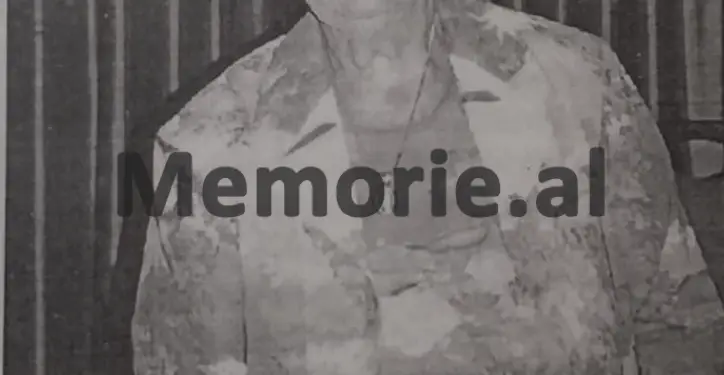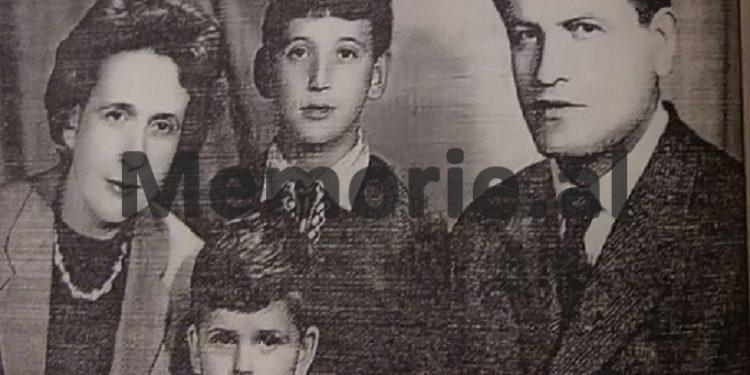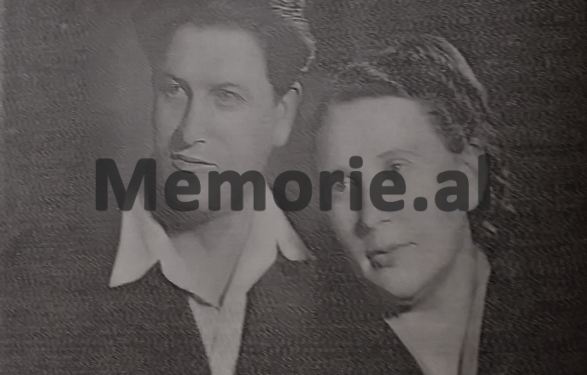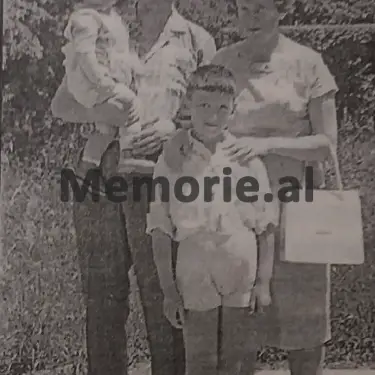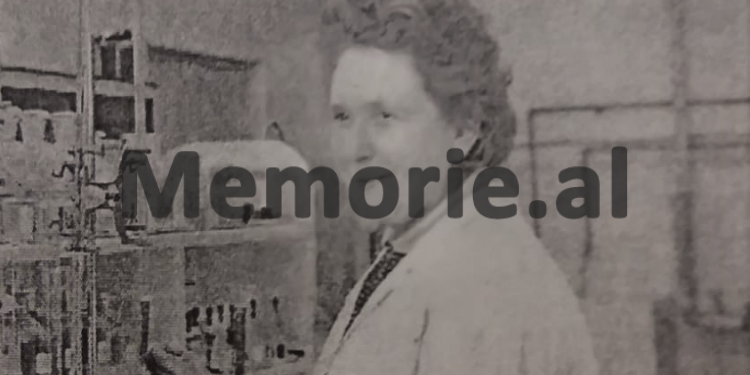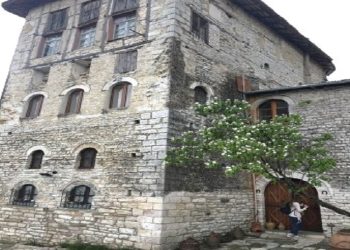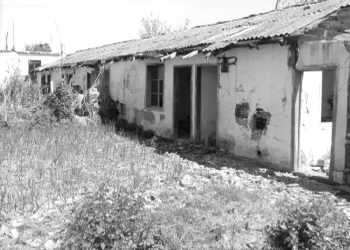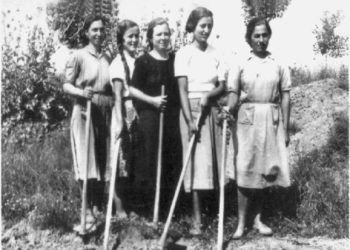Taisa Batkina Pisha
Part twenty-two
Memorie.al/ publishes the unknown story of the Russian Taisa Batkina (Pine), originally from Tula, Russia, the third child of a very poor rural family, who was left an orphan at a very young age, after her father lost his life while working in one of the coal galleries on the outskirts of Tula, where he worked as a miner (shortly after escaping arrest, accused of “supporting the enemies of the people”) and she grew up with difficulty great economic, as their city continued to be under the bombardment of German forces, which had reached as far as near Kursk. Taisa graduated from the Faculty of Chemistry, near the ‘Lomonosov’ University of Moscow, where she met and married the Albanian student, Gaqo Pisha, originally from the city of Korça, who at that time was studying at the Faculty of Philosophy in Moscow and both together in 1957, they returned to Albania, together with their newborn son, Sasha, and began life in the city of Tirana, where Taisa was appointed as a professor of Chemistry at the State University of Tirana, while Gaqo, in the chair of Marxism- where they worked until 1976, when the State Security arrested Taisa Batkina on fabricated charges, accusing her of being a “Soviet KGB agent” and sentencing her to 16 years in political prison, which she suffered. in the “Women’s Prison” in the city “Stalin”, from where she was released in 1986, while her husband, Gaqo Pisha, had died in 1983, from a serious illness. The tragic story of Taisa Batkina (Pine), in the inhuman camps and prisons of Enver Hoxha’s communist regime, where she spent a decade of her life, along with many compatriots from the former Soviet Union, or other Eastern European countries, comes through her memories, published in a book entitled “We hoped and survived”, memories which, her son, Aleksandër Pisha, kindly offered her for publication, in Memorie.al
We hoped and survived
I dedicate it to the bright memory of my husband, GAQO PISHA
This is a book of memories. In it I want to tell about my life and that of my friends, Soviet women, who tried prison for several years just because they got the courage and got married and linked their fate with that of Albanian students. The prison was part of the great GULAG in the small Balkan country, Albania, where for many years the bloody communist regime of Enver Hoxha ruled, who was a loyal student of Stalin and a follower of his cause.
Through this book I would like everyone to learn about the inhuman trials we experienced and the horrible years we spent in Albanian prisons, just because we… fell in love! And let no one ever forget what totalitarianism, despotism is and what the consequences of this system are.
Continued from the previous issue
Prena
All their brothers and their wives were arrested, including Prena’s eldest son, who had just turned 14. After some time, the younger brother’s wife was released, and along with the children, the elders sent them home. She had to take care of the children and elderly parents. The court sentenced the priest to be shot, while the other brothers were given 25 years. Lezes, Prena and the son of the latter, from 10 years. When I was first brought to the camp, Lezja and Prena had served most of their sentences. They had worked in the field for many years, then “retired”. Now they no longer come to work, for health and age reasons. The men helped a little. Prisoners in the men’s camps worked in the copper and chrome mines in appalling conditions. There they earned some money, which they sent to families at home and women in prison. Prena’s husband became seriously ill in prison and died shortly afterwards. Lezja carefully kept the death of her husband a secret from Prena and took care of her sister-in-law, like a small child. Before being released, all the highlanders sewed national costumes. Lezja told us that in their villages they did not wear other clothes and that they could not break the habit. From the prison uniform, they sewed everything they needed by hand. Before leaving, Lezja said: “We spent 10 years in prison, waiting for amnesty every six months.”
Amnesty!
That was the most curved word in the camp. Every 4-5 months rumors of amnesty were whispered throughout the camp. At first, only conversations with each other, then someone after meeting with his people declared: “Here, before the holiday (May 1, March 8, the Day of Liberation or Independence, the proclamation of the Republic, etc.) there will surely be amnesty”! The words rolled and multiplied like an avalanche, they were “very accurate”, “someone said”, “I heard it in the ministry”…! But the party was coming and there was no amnesty. Disappointment and aggravated mood prevailed in the camp. But not much time passed and everything started from scratch: hope, talk, voices…! Everyone seemed to take heart and wait for the amnesty. (In Albania there was no amnesty from 1962 to 1982). But, perhaps, this expectation helped us! It helped us to endure all the troubles that had befallen us. It helped us not to fall into a state of utter despair, depression. One cannot live without hope; we could only gain freedom through amnesty. And we hoped! All the expectations in the world can be compared to the expectation of amnesty, and the expectation of amnesty is not comparable to any other.
Nailja and Sulbia
How many toothless old women there were in the camp! This was my first impression when we first arrived at the camp. But we later learned that toothless old women were not old women; most of them were not even 40 years old! They had lost their teeth in prison. Almost everyone there had no teeth; very soon we became one too. No one treated their teeth. In the camp regulations there were many rights for prisoners, but they were never respected. It said that the camp chiefs were obliged to organize the control and treatment of the prisoners’ teeth. But his teeth only gritted when the pain became unbearable. There were ten or twenty such miserable people and they were taken to the neighboring village, where the doctor gritted his teeth in the presence of the guards. We relieved the toothache in the camp with all kinds of folk remedies. The safest way was the one with the newspaper. We took the newspaper, made a mess of it, put the tip in the glass, and lit the other side. At the bottom of the glass were left some black dots, we collected them and put them on the diseased tooth. The pain subsided. Apparently those black dots, which remained at the end, were with the metal salts contained in the newspaper ink. I started writing about Naile and avoided teething because that was the first impression Nailja left, a round-faced old woman without teeth. But when she took off her rough work uniform, we noticed that she was not an old woman at all, that she had become a prisoner. She was… 35 years old at the time. Nailja was from Dibra, a highland near the border with Yugoslavia. Her fate resembled that of many other prisoners. Naile’s husband and his brother had a very strained relationship with the leaders of the newly formed cooperative, so much so that they could not bear it and decided to flee to Yugoslavia.
In Albania, but also in Macedonia, on the border with Albania, there is Dibra e Madhe, inhabited by Albanians. On both sides of the border lived people with blood ties between them, which gave people hope that, once they crossed into Yugoslavia, they would easily adjust and lead a normal life. But the Yugoslav authorities did not provide shelter to Naile’s family and sent her back to Albania. Both brothers were sentenced to 25 years in prison each, while Nailja 10, and the wife of the younger brother, Hasija, 15. Hasija’s youngest son fell ill and died, and her three orphaned children were taken away brother, who had large family, with many children and elderly father. They lived in great poverty. Even Nailes no one came to see him, no one helped him. Even on the contrary; the little money she earned working in the field, she sent home, for the children. Nailja was a good and compassionate woman, always ready to help others, so she enjoyed the respect and authority of women. Just one word from her was enough to put an end to the quarrels. I repeat I will never forget the half-grain onion she gave me there, in the field and her words: “Everything will be fixed, you will have everything you need, you will get used to it”. Yes, we would have ile Nailen herself, always ready to help us on the field. At that time, an 8-year school and courses were opened in the camp. Nailja, who had not finished school in the village (because she simply did not have one), finished the eighth grade excellently and the course for the Electrical branch. I just do not know, he took this course, after serving his sentence, 10 years and was released…! Nailja was friends with Sulbija, they worked together constantly. They were from the same country, and their fate was similar. Sulbija also fled to Yugoslavia, lived there for a year, then the Yugoslav authorities returned him to Albania. He was sentenced to 12 years, which he did one by one. Sulbija was a young, beautiful, proud, powerful woman. He never quarreled with others, saw only his own work, and behaved calmly and independently. Somewhere near his brother lived his daughter, whom he had not seen in years. He has often helped us, in words and deeds, which were very valuable in the camp and Cannot be forgotten.
Magdalena
Along with us in the field, with our brigade, worked a tiny old woman. She was very agile at work, digging, threshing and assembling very quickly. At first I said he would be over 60 years old and I was amazed at how he was brought to work in the field. But she was no more than forty-five. In the corps she sat alone, ate quickly, sat on her bed, and took care of her own affairs. He did not speak Albanian very well. In Albania, like her, the Greeks spoke, a national minority living in the south of the country. This woman was called Magdalena. In the camp they treated him well, helped him, and supported him. He liked to make humor, to laugh. I liked it and very quickly we established good relationships. One day he had a severe epileptic seizure. I was stunned when I saw him shake hands during the crisis, as if pushing, pushing something or someone away from himself. I was told that such crises used to happen to him often, but now, fortunately, they have become rarer. Slowly I learned her story. Magdalena was Greek from a village in Saranda in southern Albania, where the Greek minority lives. At the age of 16 she married the teacher of the school where she taught herself. She gave birth to a son, then a daughter. The villages of southern Albania lived relatively better; citrus grows there, trees of various kinds, grapes, but also livestock was more developed. The villages were located very close to the border with Greece. Many locals had relatives close to Greece and America. Magdalena’s husband had a wealthy uncle in America. On the other hand, Magdalena’s husband did not have much sympathy for the communist regime in power. He dreamed of fleeing, of crossing the border, but Magdalena refused, did not want to leave her most beloved people. One morning Magdalena was doing the usual chores on the second floor of their house. In the yard her 16-year-old son and his friends were playing with some scrap metal. Suddenly a terrible explosion was heard. Magdalena spotted her son, lying in a pool of blood and turned towards him, jumping from the balcony. He received some serious head trauma and spent many days in the hospital between life and death. When he finally came back to life, he learned of his son’s death. Terrible seizures of epilepsy were the result of trauma and horror experienced. But life went on…!
A year later Magdalena gave birth to her second daughter. When the baby turned two months old, the husband finally collected his mind ball, to cross the border. He found safe and experienced companions who had crossed the border. Magdalena told me that in the villages near the border you rarely find families, so that there were no people in Greece, from those who had fled from Albania. There were many others, crossing the border, meeting their people and returning again. But in the case of Magdalena, the escorts refused to allow a woman with a two-month-old baby to cross the border. It was decided that Magdalena’s husband and his brother would cross the border and after a few months would send people to take Magdalena. Magdalena’s husband crossed the border, but the woman was immediately arrested. She was questioned at length in the State Security offices, but she did not speak, insisting that she knew nothing about her husband’s decision and his escape. He was released. In the 1960s, when these events took place, there could still be some rare instance of humane treatment of women with young children. A few months later the day was set when Magdalena with the children had to cross the border. She went to her parents, whose house was very close to the border. The man did not tell her, but she was extremely nervous. The younger brother noticed her condition and started asking her. Magdalena for a long time did not speak, did not want to confuse her brother in that matter. But the brother insisted, and Magdalena finally told him about the escape he was preparing. The brother decided to leave with his sister; he did not want to let Magdalena risk having two small children. At night, on the way to the place where they would cross the border, Magdalena started having a crisis, the children started crying and her brother tried to help her. The border guards heard the noise, came and arrested them all. Companions could be deleted; they knew that if they fell into the hands of the security, they would shoot them.
Magdalena and her brother went on trial and were sentenced to 17 and 18 years in prison, respectively. The girls were taken to raise Magdalena and her husband’s parents. Her parents denied her daughter, cursed her, as required at the time. The little girl was raised in such a way that she hated her parents, her mother. Magdalena spent 17 years in prison, during which time her father-in-law only once brought his eldest daughter to the meeting. The early years allowed her to get help from her husband in America. But when they learned that her husband worked for the Voice of America in the US, they stopped taking money from him. Magdalena spent many years in prison without any help, working in the field. The eldest daughter grew up and married. His father helped him (the authorities allowed material aid from abroad because the state needed foreign currency). For the wedding he brought as a gift a color TV. There were very few televisions in poor Albania, and color ones were very rare. Soon, the husband and father-in-law of Magdalena’s daughter entered the prison. Because it became television from America. They accused them of gathering relatives, friends and comrades and watching shows on Greek stations. This was described as agitation and propaganda. Magdalena’s husband repeatedly appealed to the Albanian government to release his wife, but this returned to Magdalena and her relatives, in new persecution.
Magdalena’s brother worked in prison and received points, so he was released a year and a half ago, a few months before Magdalena was released. He sent a telegram to his sister, that one day he would go out and come to meet her at the camp. I well remember that difficult day, when Magdalena was sitting on top of the hill and waiting with her gaze from the gate. But the brother did not come. Everyone felt bad in their souls, they understood, that something would have happened. We knew that the organs were not easily separated from their victims and we were right. The next day another telegram came. The brother wrote to Magdalena that as soon as he was released, he was sent straight into exile. Several more months passed. Magdalena’s prison term is over. There were… 17 years left. No one came to get Magdalena. Just as tiny, skinny as she was, she could barely drag the bag with the most essentials. Everyone was running away from them, avoiding them. Nobody wanted to help him. You had to walk over 15 kilometers to the car route. Anyway, she got home, stayed with her daughters… 5 days and received the next sentence, she was hanged in exile. After a while, they brought their daughters, who were interned together with their families. I do not know anything else about Magdalena, but I am convinced that, after the fall of the communist regime in Albania, she will finally be reunited with her husband and the father will have embraced his daughters and grandchildren.
Hasimeja
There were many young women in the camp, who had tried to flee the country with their loved ones. (It did not even cross his mind, but someone made a report and that was enough to arrest them). Most often these were young girls, who fell in love with married men. The Albanian reality and the Albanian mentality did not give them any hope that they could unite their destinies. Opinion condemned them. So they hoped to start a family abroad, they hoped for a better life. Among them were very good girls. The best was Hasime. She was from Tropoja, a city in the Albanian Alps. Tall, beautiful, with a long braid, good, compassionate, smart. We all loved her and called her “Spinner.” Natasha called her “daughter”. She reminded Natasha of her daughter, who at the time could not come to her mother. I mentioned above, how Hasimeja helped us, how he always waited for us, to help us cross the wide canal, accompanied us to the camp the first days, taught us how to work in the fields… for everything he helped us. She came from a rural family, where she was the eldest. His father loved him very much; wherever he went he took him with him. Hasimeja was different from the other girls in the village; she was more relaxed, more emancipated. Kindness, gentleness and beauty made her very attractive. Many boys had fallen in love with her, but she wanted a married man, crossed the border with him, and took refuge in Yugoslavia. A year later, the Yugoslav authorities returned the two to Albania. Hasime was sentenced to 17 years for fleeing, while her husband was sentenced to 25.
Her family denied it; relatives had cursed her since she fled abroad. No one came to meet him, no one helped him. He seldom took letters from his sisters and always shed tears of grief when he read them. Hasime was young and powerful. When he was put in prison, he was 20 years old. He was accustomed to working in the fields and was not physically difficult, but he suffered greatly spiritually. How many times did we feel like crying at night, when he could not stand it anymore, when he got sick or received some news from home? The man most dear to him was the father. She often called him to sleep, at night. It is impossible to describe her grief when she received the news of his death. Hasimeja did 12 years in prison and came out with the amnesty of 1986. 12 years in prison! Why? Because… loved! There were many issues of this kind. It was a group of women from the city of Elbasan. Their file was also hatched due to the love of one of them with a Yugoslav doctor. This was the reason, and then the issue was invented with plans to escape abroad, not to escalate it. A group was formed, all taken from several years in prison and made one by one. In Albania, the interference of party and state structures in the private lives of the people had become the norm. They fearlessly forbade marriage, or “did not recommend” it (it was like forbidding it). They demanded the separation of the spouses, when it seemed to them that one marriage or another did not meet the norms set by them. Those who disobeyed were usually punished. /Memorie.al
The next issue follows




